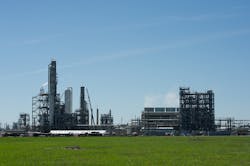Dow plans retrofit of Louisiana mixed-feed cracker
Dow Chemical Co. is retrofitting its proprietary fluidized catalytic dehydrogenation (FCDH) technology into one of its mixed-feed crackers in Plaquemine, La., to produce on-purpose propylene.
The retrofit—which comes as part of the company’s current slate of low-capital intensity, high-return incremental growth investments—will enable production of more than 100,000 tonnes/year of additional on-purpose propylene at full run-rate, further back-integrating Dow’s derivative facilities to cost-advantaged propylene while also maintaining the unit’s current ethylene production capacity, Dow said.
The project is scheduled to begin producing on-purpose propylene by yearend 2021.
Dow said the retrofit will enable the company to continue meeting rising demand for its businesses serving consumer, infrastructure, and packaging end-markets, while also remaining within its stated near-term capital expenditure targets.
The proposed Plaquemine retrofit follows Dow’s 2016 expansion of ethylene capacity of this same cracker by more than 225,000 tpy, which added the ability to crack ethane while maintaining the flexibility to crack propane, butane, and naphtha (OGJ Online, Nov. 7, 2016; July 29, 2013).
Dow, however, did not disclose current production capacities of existing crackers at the Plaquemine site.
Technology benefits
The Plaquemine retrofit comes amid Dow and other US cracker operator’s growing consumption of ethane instead of heavier feed slates, resulting in a reduction of coproduct production, including propylene. This reduction in propylene has created a supply-demand gap in the US that requires additional on-purpose propylene sources to meet the needs of downstream derivatives, according to the operator.
Alongside enabling production of reliable and cost-efficient on-purpose propylene from cost-advantaged US shale gas feedstocks to supply Dow’s integrated derivative units in Louisiana, the FCDH technology retrofit also will allow reduced capital outlay by up to 25% and lower energy usage and greenhouse gas emissions by up to 20%, thereby improving overall sustainability when compared to conventional propane dehydrogenation technologies, the company said.
Dow also recently licensed its FCDH technology to PetroLogistics ll LLC for its planned 500,000-tpy propane dehydrogenation unit to be built on the US Gulf Coast (OGJ Online, July 15, 2019).
Contact Robert Brelsford at [email protected].
About the Author
Robert Brelsford
Downstream Editor
Robert Brelsford joined Oil & Gas Journal in October 2013 as downstream technology editor after 8 years as a crude oil price and news reporter on spot crude transactions at the US Gulf Coast, West Coast, Canadian, and Latin American markets. He holds a BA (2000) in English from Rice University and an MS (2003) in education and social policy from Northwestern University.

